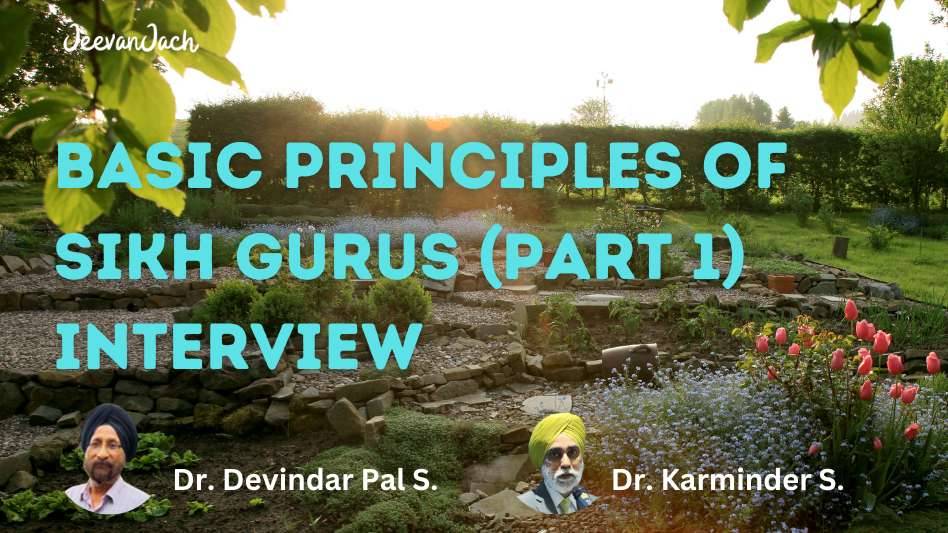 Choices, decisions and outcomes! This is what we are all faced with daily in our life. Question is, are we fully aware of the outcomes of the decisions we make? Are they rudimentary? Are we somehow making the same choices blindly? Are our decisions about life based on anything meaningful or are we just blindly following others? Sdr Harmanpreet Singh Minhas shares his thoughts (based on our Guru’s teachings) on how we can make every decision in our life more purposeful and meaningful.
Choices, decisions and outcomes! This is what we are all faced with daily in our life. Question is, are we fully aware of the outcomes of the decisions we make? Are they rudimentary? Are we somehow making the same choices blindly? Are our decisions about life based on anything meaningful or are we just blindly following others? Sdr Harmanpreet Singh Minhas shares his thoughts (based on our Guru’s teachings) on how we can make every decision in our life more purposeful and meaningful.
Guru Tegh Bahadhur Ji says,
ਤਿਲੰਗ ਮਹਲਾ ੯ ਕਾਫੀ ੴ ਸਤਿਗੁਰ ਪ੍ਰਸਾਦਿ ॥ ਚੇਤਨਾ ਹੈ ਤਉ ਚੇਤ ਲੈ ਨਿਸਿ ਦਿਨਿ ਮੈ ਪ੍ਰਾਨੀ ॥ ਛਿਨੁ ਛਿਨੁ ਅਉਧ ਬਿਹਾਤੁ ਹੈ ਫੂਟੈ ਘਟ ਜਿਉ ਪਾਨੀ ॥੧॥ ਰਹਾਉ ॥ ਹਰਿ ਗੁਨ ਕਾਹਿ ਨ ਗਾਵਹੀ ਮੂਰਖ ਅਗਿਆਨਾ ॥ ਝੂਠੈ ਲਾਲਚਿ ਲਾਗਿ ਕੈ ਨਹਿ ਮਰਨੁ ਪਛਾਨਾ ॥੧॥ ਅਜਹੂ ਕਛੁ ਬਿਗਰਿਓ ਨਹੀ ਜੋ ਪ੍ਰਭ ਗੁਨ ਗਾਵੈ ॥ ਕਹੁ ਨਾਨਕ ਤਿਹ ਭਜਨ ਤੇ ਨਿਰਭੈ ਪਦੁ ਪਾਵੈ ॥੨॥੧॥
Tilang Mehla 9 Kafi Ek Ongkaar Satgur Parsad|| Chetna Hai Tau Chetlai Nis Din Meh Praani || Shin Shin Aud Behaat Hai Footey Ghat Jio Paani|| 1||Rahao|| Har Gun Kahey Na Gawehi Murakh Agiana|| Jhoothai Laalach Laag Kai Nehi Maran Peshana ||1|| Ajhu Kach Bigrio Nehi Jo Prabh Gun Gaavey || Kho Nanak Teh Bhajan Te Nirbhey Padh Pawey ||2||1|| (SGGS 726)
Going about daily chores the mind often wonders, is there more to look forward to in life? Many people are not so sure about what they are doing, or where their life is heading. At one moment, they think that they are doing OK! and soon after, they might not be too sure.
They often think, is their life a waste? Waste not in the dramatic sense like committing a crime and spending the rest of his/her life in prison. Instead, it is about the wasting of a life that takes place over years with many seemingly small, harmless habits and decisions.
Small choices make a big difference. If you want a healthy and fulfilling relationship, choosing the right partner is important. But to make it work, you must improve your communication, be honest with yourself, look for solutions instead of problems. You must choose to love, every single day.
If you want to excel in your career, choosing the right job is important. But to excel, you must be on time, be present in meetings, work on your communication and presentation skills, meet people and build your network, take training, and overdeliver. Big outcomes are the outcomes of many small choices.
Only some come to the realization that the process of wasting their life is a slow process that doesn’t happen overnight. Regardless, the overall results are devastating. Day in and day out doing the same things (routines/choices) repeatedly. Most people don’t recognize these so-called harmless routines/choices they may have fallen into, so they go about their lives as if nothing is wrong.
But these routines/choices contribute significantly towards wasted lives if left unchecked. People often don’t realize the impacts of such routines/choices until it’s too late. Therefore, until they learn to recognize such harmful routines/choices and put measures in place to reverse them, they could very well look back on their life with regret.
In the end, you must decide for yourself how to live your life. The choice to mold your life into something positive is yours. No one knows what tomorrow will bring, but you have a choice of what you do today.
This choice will be something you either look back on fondly or do so with deep regret instead. Start something new, start something positive, start something that makes a difference today.
Guru Ji is trying to send us a similar message, in this shabad. Guru Ji is telling us NOT to waste our lives. He is instructing us to make the best use of our lifes by adopting Godly virtues in our daily life. Guru Ji is telling us that regardless of what we did in our past, where we might have wasted our lifes doing wrong or meaningless things, we can start over. We can start over and make our present and future life more meaningful and purposeful.
ਚੇਤਨਾ ਹੈ ਤਉ ਚੇਤ ਲੈ ਨਿਸਿ ਦਿਨਿ ਮੈ ਪ੍ਰਾਨੀ ॥ ਛਿਨੁ ਛਿਨੁ ਅਉਧ ਬਿਹਾਤੁ ਹੈ ਫੂਟੈ ਘਟ ਜਿਉ ਪਾਨੀ ॥੧॥ ਰਹਾਉ ॥
Chetna Hai Tau Chetlai Nis Din Meh Praani || Shin Shin Aud Behaat Hai Footey Ghat Jio Paani|| 1||Rahao||
Since these are the Rahao lines the central message of the shabad is contained within these lines. When reading and understanding the remaining lines, we need to relate them back to the Rahao lines.
Guru Ji says that imagine a clay pot (Ghat) that is filled with water (Paani). There is also a small crack within this clay pot, where the water is leaking (Footey Ghat Jio). Depending on the size of the crack, eventually, drop by drop (Shin Shin Aud Behaat Hai) all the water is going to leak away.
The clay pot, Guru Ji is mentioning here is synonymous with our life. The quantity of the water in the pot refers to the lifetime that we have left. The leaking of water is synonymous with days or nights which are just passing away (i.e. reduction in the amount of time we have left to live). Thus, every day that goes by we get closer to the end of our lifes. Guru Ji says that we have a choice (Hai Tau) to make. We can utilize what is left from now to the end of our life to understand and adopt Godly virtues in our lives (Chetna Hai Tau Chetlai) OR waste this time doing chasing for material wealth, disregrading spiritual growth. We need to work on inculcating Godly virtues continuously as adopting them takes practice and time (Nis Din Meh Praani).
To further simplify the understanding of the above:
Guru Ji is saying, we must make the best use of the time we have left to live. Each passing day brings us closer to our demise. The only way we can make the best use of our time is by understanding and adopting Godly virtues in our lives. Such virtues give our life a meaning and purpose. Once we have begun adopting Godly virtues within, feelings of stress, anxiety, trauma, worry and tension are kept at bay. Its not that we won’t have them, but we won’t get affected much by them.
Godly virtues include key character traits such as:
- truthful and simplistic living
- selflessness, fearlessness
- high moral character, humility
- love for all, hate for none
- compassion, contentment
- tolerance, forgiveness, virtuous conduct
- detachment from worldly possessions, etc.
The above are just some of Godly traits. There are many more. Godly virtues keep the desires of chasing for worldly things such as money, possessions, lustfulness, possessiveness etc. under check and brings balance into our lives. While our life is in balance, we can live a happy, fulfilled and satisfied life. We feel connected to the one God. We can realize God within his creation around us. We can enjoy everything and still remain grounded in both successes and in failures.
ਹਰਿ ਗੁਨ ਕਾਹਿ ਨ ਗਾਵਹੀ ਮੂਰਖ ਅਗਿਆਨਾ ॥ ਝੂਠੈ ਲਾਲਚਿ ਲਾਗਿ ਕੈ ਨਹਿ ਮਰਨੁ ਪਛਾਨਾ ॥੧॥
Har Gun Kahey Na Gawehi Murakh Agiana|| Jhoothai Laalach Laag Kai Neh Maran Peshana ||1||
In this shabad line, Guru Ji is looking at our foolishness (Murakh Agiana) of not seeking the obvious (Godly virtues – Har Gun) but instead we are desiring and seeking falsehood (Jhoothai Laalach). We are being ignorant as we do not recognize that we are dying spiritually (Neh Maran Peshana).
NOTE: We human being never think of physical death either. We think we’re going to live forever. But in Gurbani, the emphasis of Guru’s message is always towards ‘Spiritual’. Same thing here, Guru sahib is talking about ‘spiritual death’ and not physical death. But even so, when one is engrossed in greed and made their Live’s mission to attain material wealth and nothing more, how then can one possibly think of spiritual death?
In another shabad by Guru Amardas Ji,
ਸਬਦਿ ਮਰਹੁ ਫਿਰਿ ਜੀਵਹੁ ਸਦ ਹੀ ਤਾ ਫਿਰਿ ਮਰਣੁ ਨ ਹੋਈ ॥ ਅੰਮ੍ਰਿਤੁ ਨਾਮੁ ਸਦਾ ਮਨਿ ਮੀਠਾ ਸਬਦੇ ਪਾਵੈ ਕੋਈ ॥੩॥
Shabad Marho Phir Jeevo Sad Hi Ta Phir Maran Na Hoiee || Amrit Naam Sda Man Meetha Shabdey Pavey Koiee||3|| (SGGS 604)
Meaning,
With the understanding derived from the Shabad (teaching of the Guru) and when one adopts the teachings in their life, one will not die (spiritually). The mind is absorbed in the teachings and they pursue adopting Godly virtues that live forever (Amrit Naam).
From another perspective, if we were to look at when someone does some hideous or unthinkable or inhumane act, it is normally said that his conscious must be dead. Guru Ji says that a person who immerses himself in the teachings of the Guru (ਸਬਦਿ ਮਰਹੁ) makes his mind so impenetrable that his conscious never dies (ਫਿਰਿ ਜੀਵਹੁ ਸਦ ਹੀ ਤਾ ਫਿਰਿ ਮਰਣੁ ਨ ਹੋਈ). Conversion of a mind from where the conscious was dead to where the conscience will never die due to the influence of the Guru is the death described here. Death of bad and adoption of good.
ਅਜਹੂ ਕਛੁ ਬਿਗਰਿਓ ਨਹੀ ਜੋ ਪ੍ਰਭ ਗੁਨ ਗਾਵੈ ॥ ਕਹੁ ਨਾਨਕ ਤਿਹ ਭਜਨ ਤੇ ਨਿਰਭੈ ਪਦੁ ਪਾਵੈ ॥੨॥੧॥
Ajhu Kach Bigrio Nehi Jo Prabh Gun Gaavey || Kho Nanak Teh Bhajan Te Nirbhey Padh Pawey ||2||1||
It’s not too late. The milk has not spilled (Ajhu Kach Bigrio Nehi). This means that you have a chance to improve yourself and your life. Guru Ji gives us a simple method to improve ourselves and our future. His method is for us to learn about and adopt Godly virtues in our lives (Jo Prabh Gun Gaavey). By doing so, our lifes will become more meaningful and purposeful.
We will lose all the fears that hold us back in life. We constantly worry or fear about what will go wrong. Some of these fears include fear of failure, rejection, fear of change, imperfection (or not being good enough), death, loneliness etc. Such fears are the major cause of depression in many human beings. It’s normal to feel sad about or grieve over difficult life situations, such as losing your job or a divorce. But depression is different as it has a negative impact which can prolong and persists for days, weeks, months and sometimes years.
Gurbani teaches us to be mentally tough. Ups and downs are part of the fabric of life and cannot be changed. We need to teach ourselves not to over react to them. Guru Ji says, to reach such an elevated and strong state of mind (Nirbhey Padh Pawey) we must realize and inculcate God virtues (Teh Bhajan Te). By doing so, the sense or the feeling that we are wasting our life will go away and our life will become more meaningful and purposeful.
Living life with Godly virtues is about making the right choices. It is about inner transformation. It’s about constantly choosing right over wrong. It is about thinking about global good.
For the individuals who might think that meer singing and reading of Gurbani is enough, the word Godly attributes (Har Gun and Prabẖ Gun) has been used twice in this three-line Shabad and probably hundreds of instances throughout Guru Granth Sahib.
In another Shabad, Guru Nanak says,
ਆਪਣ ਹਥੀ ਆਪਣਾ ਆਪੇ ਹੀ ਕਾਜੁ ਸਵਾਰੀਐ ॥੨੦॥
Aapan Hathi Aapna Apey Hi Kaaj Sawariey ||20|| (SGGS 474)
Meaning,
It is in ones own hands (Aapan Hathi) that one is able to realize and adopt Godly virtues and live a fulfilled spiritual life (Kaaj Sawariey). Self-improvement and realization of God is to be done by yourself only through your own effort and hard work. Not by paying a Granthi in a Gurdwara asking him to do Ardaas, Akhand paaths, Sukhmani Sahib paaths or Langgars).
Many religions believe that your past actions dictate your future luck, not only in the present life but in the future (reincarnated) lives too. First of all, Gurbani does not endorse reincarnation. Secondly, we make our own future by living our present life.
Speaking about decisions and choices, we humans have an average life expectancy of 72-years. This translates to 25,000 days. During an average day, a person can easily make up to 100 decisions — for example, when to get up, if to hit the snooze button on the alarm clock, what to wear, to hit the gym or not, what food to eat, what drinks to drink so on and so forth. That’s a total of 2.5 million decisions we will make during our lifetime.
Based on the lessons of Gurbani let’s make each of these decisions count to make our life more meaningful and purposeful.



